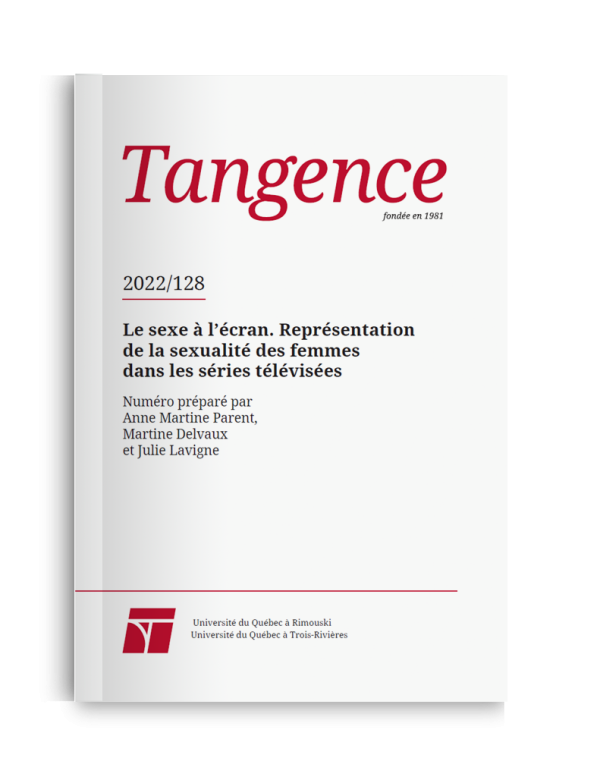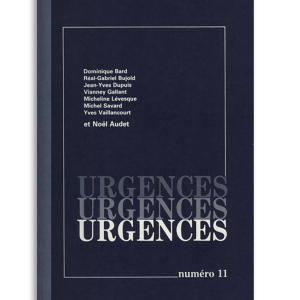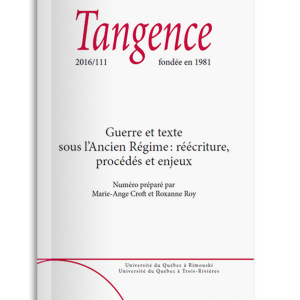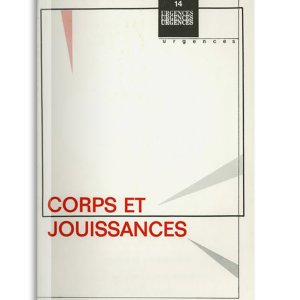Female friendships in the service of sexuality in “female chorus” TV series (2010-2020)
Céline Morin
Television series have long favoured the type of heroine who had to overcome sexist barriers by mobilizing individual resources in her drive toward personal emancipation. Today this movement is coupled with a wave of what we call “female chorus” series, focused on couples or groups of women who strongly support each other. This article explores six of these productions : Girls, Mom, Jane the Virgin, Crazy Ex-Girlfriend, Grace & Frankie and Sex Education. The characters in these series place their friendships at the service of private forums characterized by a female solidarity supportive of individual sexuality and rooted in the recognition of desires and experiences. This perspective opens the way to major representational innovations including, notably, the diversification of represented corporalities or the sexual coming-of-age of everyone from adolescents to seniors.
Sexual scripts and lesbian emotional experiences in The L Word
Sabrina Maiorano
The lesbian series The L Word (2004-2009) resonated strongly in popular culture and within lesbian communities in terms of recognition and visibility. Close to fifteen years later, it’s important to take a critical look at the series because of the political transformations of the LGBTQ+ movement and the growing emphasis on queer perspectives. This article proposes to analyze the sexual and gender scripts conveyed in the series (mainly in season 1) in light of the concept of emotional experiences. Lesbian sexuality in The L Word is punctuated by multiple relationships of power between the female characters (inequalities of race, age, class and sexual experience). The consideration of emotions in the series’ sexual scripts and lesbian archetypes presents a heterogeneous but lesbonormative representation of lesbian sexuality.
The queerization of the succubus myth : bisexual scripts in Lost Girl
Julie Lavigne
The present article presents a textual analysis of the fantastical Canadian series Lost Girl (Showcase, 2010-2015) created by Michelle Lovretta. Employing feminist theories, studies on bisexuality and sexual script theory, this article focuses on the transgressions represented in the series relative to the often passive roles of women in traditional heterosexual scripts. The plots of Lost Girl center on the character of Bo Dennis, a bisexual succubus who practices multi-partner sex. The series innovates by presenting an active, agentive woman who practices a healthy and unrestrained sexuality without experiencing the slut shaming associated with this type of transgression. The analysis also shows that the character’s bisexuality allows the patriarchal figure of the succubus embodying the male fear of female sexuality to be transformed into a heroic, feminist, queer and antispeciesist figure.
“I can’t control my body, and it does all these things.” Considering the (de)construction potential of norms related to gender and the representation of female desire in online TV series for young adults
Stéphany Boisvert
This article proposes to analyze several original young adult series streaming on Netflix or Amazon Prime in order to examine the (de) construction potential of sexual scripts and the representation of young women’s sexual agentivity in the era of online television. Teen drama is recognized as a television genre that usually promotes heteronormative narratives where references to queer sexualities and desires are often implicit. What’s more, these series tend to emphasize a view of young women’s sexual passivity. However a mutation of these narrative tendencies is observed in several young adult series on Netflix and Amazon, suggesting a transformation of sexual scripts and a desire to subvert the usual normative views of female sexuality. Accordingly, there appears to be a greater tendency to represent young women’s sexual assertiveness and agentivity. These representations remain influenced, nevertheless, by certain cultural norms that contour the narratives, sexual scripts and representations of bodies. The present article therefore aims to critically examine the ambivalences in the new teen dramas.
Between awkwardness and authenticity : the search for pleasure in Mrs. Fletcher
Marta Boni
The new forms of TV series portray female characters who are grotesque, dissident, in other words, out of step with the norm. This article focuses on one such character, the protagonist of the series Mrs. Fletcher. This HBO series, a mix of comedy and drama, depicts the discovery of pornography by a 45-year-old woman played by Kathryn Hahn. By analyzing the series’ representation of desire and transgression, we discuss the idea of a pleasure that becomes a form of knowledge and propose a playlist of contemporary series gauging awkwardness and authenticity.
The reappropriation of space as vector of sexual agentivity in Spike Lee’s She’s Gotta Have It
Audrey Deveault
This article focuses on the character of Nola Darling with a view to analyzing how the first season of the TV series She’s Gotta Have It (2017) politicizes the narratives women create around their sexuality and the sexual violence they experience. After a brief comparison with the 1986 film of the same title, the article underscores the transformations related to Nola’s sexual agentivity, which is shaped by both the reappropriation of space (private/public) and the interweaving of her narrative with that of the other women and, more broadly, the other residents in the Fort Greene area. It is, notably, Nola’s artistic practice that enables these two elements. In summary, the article shows that sexual agentivity in the series develops collectively ; in other words, it is created through the experience of a community.
“So many different types of sexual assault”. Sexual violence and consent in TV series
Anne Martine Parent
This article examines the representation of sexual violence and consent in contemporary TV series. It gives a brief explanation of rape culture and then describes how the British series I May Destroy You denounces this culture. The article then discusses the opposition between the male gaze and the female gaze using the example of the American series Grand Army. If the female gaze is sometimes part of the pattern of Rape and Revenge found in films like Thelma & Louise, it is present in certain TV series as well. This is demonstrated in the present article, which examines the British series Sex Education. Finally, the article aims to examine this pattern of vengeance against the notion of the feminist snap theorized by Sara Ahmed.






